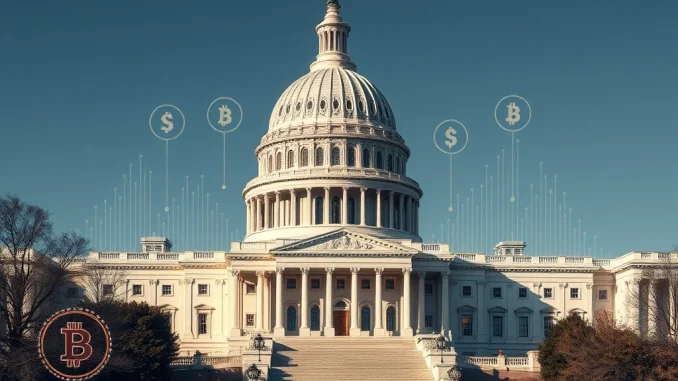
Exciting news is buzzing in the crypto world! The U.S. Senate has just passed the GENIUS Act, a significant piece of legislation aimed at bringing clarity and structure to the stablecoin market. This move has caught the attention of key figures, including White House A.I. and crypto advisor David Sacks, who didn’t hesitate to call it a “big win” for the entire crypto community during a recent interview on Fox News. But what exactly does this bill entail, and why is it being viewed so positively?
Understanding the GENIUS Act and Stablecoin Regulation
The GENIUS Act isn’t just another bill; it’s a comprehensive attempt to establish a federal framework for stablecoins, which are cryptocurrencies designed to maintain a stable value, often pegged to a traditional currency like the U.S. dollar. The lack of clear stablecoin regulation has been a point of concern for both regulators and market participants, creating uncertainty and potentially hindering growth. This bill aims to address that by introducing specific requirements:
- Licensing Mandates: It would require stablecoin issuers to obtain specific licenses to operate. This aims to ensure that only legitimate and compliant entities can issue stablecoins.
- 100% Reserve Requirements: Issuers would be mandated to hold reserves equal to 100% of the value of the stablecoins they issue. This is crucial for maintaining the stable peg and protecting holders in case of redemptions.
- Annual Audits: For larger issuers (those with a market cap of $50 billion or more), the bill requires annual audits. This adds a layer of transparency and accountability.
- Foreign Issuer Regulations: The legislation also includes provisions to regulate foreign stablecoin issuers operating within the U.S., aiming to create a level playing field and prevent regulatory arbitrage.
These measures are intended to enhance the stability and trustworthiness of stablecoins, making them a more reliable tool for transactions and potentially integrating them further into the mainstream financial system.
Why Does David Sacks See This as a Win for David Sacks Crypto Interests?
David Sacks crypto advisor to the White House, views the Senate’s passage of the GENIUS Act as a significant positive step. His perspective highlights the importance of regulatory clarity for the industry’s maturation and growth. For years, the crypto space has operated under a cloud of regulatory uncertainty in the U.S., with various agencies vying for oversight and no single, cohesive framework in place, particularly for stablecoins. Sacks’ endorsement suggests that having *any* clear federal regulation, even if not perfect, is better than the current ambiguity. It provides a roadmap for businesses and investors, potentially unlocking further innovation and investment in the U.S. market. By setting clear rules for stablecoins, the bill could legitimize their use and pave the way for broader adoption, which is ultimately beneficial for the entire crypto ecosystem.
The Journey of the Senate Crypto Bill: What’s Next?
The passage in the Senate is a major hurdle cleared, but the Senate crypto bill‘s journey is far from over. The legislation now moves to the House of Representatives. The House will debate the bill, potentially propose amendments, and then vote on it. If the House passes the bill, it will then head to the President’s desk for signature to become law. This multi-step process means there could still be changes or delays. The crypto community and industry stakeholders will be closely watching the House proceedings, as their input and lobbying efforts could influence the final version of the bill. The potential for it to reach President Donald Trump’s desk adds another layer of political intrigue to the process.
Broader Implications for US Crypto Law
The GENIUS Act represents a critical piece in the evolving landscape of US crypto law. While it specifically targets stablecoins, its passage signals a growing willingness within the U.S. government to engage with and regulate the digital asset space. This could set a precedent for how other areas of crypto, such as exchanges, decentralized finance (DeFi), or non-fungible tokens (NFTs), might be approached by lawmakers in the future. For stablecoin issuers, the bill necessitates operational changes to meet the new licensing and reserve requirements. For users, it could mean increased confidence in the stability and reliability of regulated stablecoins. This legislative movement underscores the increasing integration of crypto into discussions about national financial policy and its potential impact on the broader economy.
Conclusion: A Step Towards Regulatory Clarity
The Senate’s approval of the GENIUS Act is undoubtedly a landmark moment for the U.S. crypto industry, as highlighted by David Sacks. By proposing a clear framework for stablecoin regulation, including licensing, 100% reserves, and audits, the bill addresses key concerns about stability and consumer protection. While the legislative process continues with the bill heading to the House, its initial success in the Senate is a positive indicator of progress towards establishing much-needed regulatory clarity. This development is a significant step in the ongoing effort to define the future of US crypto law and integrate digital assets into the financial mainstream responsibly.



